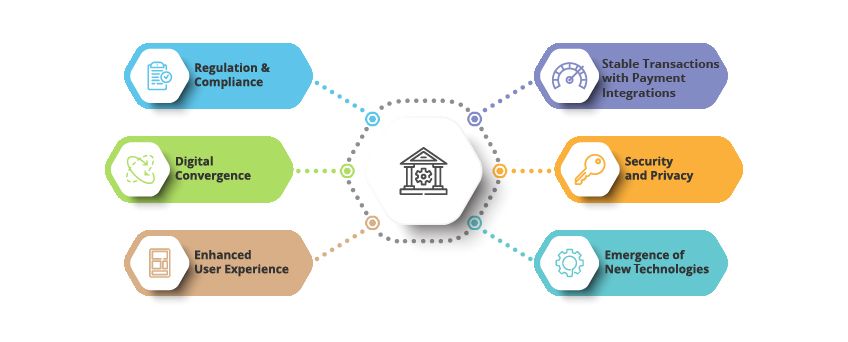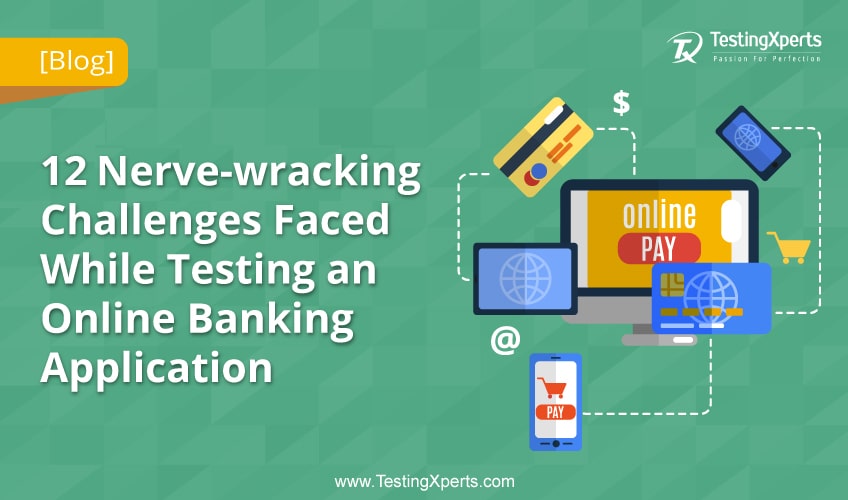
The financial services domain is undergoing tremendous change due to technological advancements and digitalization. The banking domain has a significant dependence on technology-enabled products with an essential need to have stable and well-performing products to ensure a great customer experience. Moreover, it is also vital that all activities performed by banking software should run smoothly and be error-free to deliver safe and secure transactions.
Contents
5. Stable Transactions with Payment Integrations
6. What are the Steps Involved in Banking App Testing?
7. What are the challenges faced while testing banking applications?
9. Why you should partner with TestingXperts?
Evidently, all customer-facing channels such as Banking and FinTech continue to undergo rapid changes due to digitization, and the need for effective testing has increased manifold to enable stable products. Especially for banking applications, it is critical to have high-performing apps, as they tend to serve millions of transactions. Importantly, there are certain characteristics with respect to banking applications that require deep analysis to enable stable and high-performing apps.
Banking applications should be able to deliver safe and secure transactions, for which effective end-to-end software testing of their systems is required. It should be taken up using various types of software testing methods to ensure defect-free applications. Moreover, as the banking software applications are complicated with many dependencies, thus the testing process requires more time and a complete understanding of the scope.
What are the essential features of a banking application?
• The apps should perform multi-tier functionalities, i.e. it has to support numerous concurrent user sessions
• The apps should have the ability to perform large-scale integrations with several other applications
• The apps must produce secure transactions with data protection
• The apps should have a secured storage system to store every user’s confidential information of the user
• The banking apps should be able to support and function even with complex business workflows
• The applications should be able to provide real-time services without any delays while transacting
• The applications must be able to perform a number of transactions at lesser time
• The apps should be able to track every transaction detail and report them to the user
• The banking apps must be strong to troubleshoot every issue raised by the user
• The apps must have the disaster or recovery management system to protect the users from critical scenarios
Why software testing for banking apps?
1. Regulation & Compliance:
There is an increased focus on business transparency globally and there is a strong need to abide by certain regulatory compliance terms. Hence, efficient software testing is required to suffice various open banking API terms and conditions.
2. Digital Convergence:
Digitalization has brought in a paradigm shift in the banking services domain with the emergence of smartphones, tablets, and IoT based devices. The digital payments have eased the transactions to paperless currency for which end-to-end testing is utmost required.
3. Enhanced User Experience:
Today, users are tech-savvy with ever-changing customer expectations. The customer experience(CX) is at the heart of any business. There is more emphasis laid on application aspects such as usability, great user interface (UI) and stable performance at peak loads. In order to achieve all these intricate features, effective usability testing along with end-to-end performance testing is required to deliver great user experience (UX) and flawless performance.
4. Stable Transactions with Payment Integrations:
Banking apps require a stable payment gateway integrations to ensure effective transactions to customers. To achieve this, effective software testing is necessary.
5. Security and Privacy:
For all banking applications, the topmost priority is to safeguard the customer’s critical data and ensure safe transactions. With the cyber-attacks being rampant, it is important for banking applications to undergo vigorous security testing to protect and deliver a secure environment for customer transactions.
6. Emergence of New Technologies:
In order to reach more customers quickly, mobile banking has evolved in a large way with voice recognition apps and browser service applications. These apps should be thoroughly tested before going live to the market to ensure a flawless experience.
What are the Steps Involved in Banking App Testing?
Segregation of Data: The initial step in banking app testing is to perform research by gaining domain knowledge and understanding the expected industry standards.
Identification of the required tests: Based on the research performed, test requirements are implemented to meet the functional and business goals.
Creation of banking app test cases: An online banking application test suite is created based on the aspects of application’s performance, user experience, functionality, and security aspects.
Implementation of Functional testing: Testing activities such as test case review, test case execution, and test case preparation are run to validate and check whether the required functionalities are met as expected or not as outlined in the requirements document.
Validation of Database Structure: Data should be stored in an easy and structured format and follow the mechanism of data restoration.
Data Encryption and Authentication: User Authentication and data encryption are assessed to ensure no data breach is reported in the banking app. In order to achieve this, banks are required to implement a multi-layer validation process, such as OTP or One Time Password. Automation tools like HPWebInspect and IBM App Scan can be used to perform security testing; and for manual testing tools like HTTP watch, Proxy Sniffer, Paros Proxy, etc. can be used.
Examination of App Usability: In order to ensure the app usability for all, tests are performed to examine how easy is the app usage across its system
Validation of App Performance: The banking apps are monitored to check the app performance and the speed for loading the page across various browsers.
Confirmation of User-Acceptance: With a constant testing practice, the performance of the banking application is monitored to confirm the app is error-free and meets the required user-acceptance. Also, it is the last stage of testing performed by the end-users by considering the real-world scenarios.
What are the challenges faced while testing banking applications?
• Challenge to maintain consistency across devices and systems:
The banking applications are critical to users, hence the developer has to ensure that the app functions effectively for the user. The app needs to work consistently across various operating systems and different browsers. The user should be able to use the app on the latest and older version of iOS and Android devices.
• Challenge while Data transfer during system migration:
This is one of the biggest challenges while testing banking app as during system migration, i.e. migration from the older system to the new system, end-to-end testing of all procedures, and routines should be taken up. So, the team has to consider these requirements and as well make sure that the data is identified before transferring and uploading to the new system.
• Challenges dealing with real-time updates:
The teams need to verify the mobile banking apps stability to deal and provide real-time updates for the app users. This is really a big challenge while performing the integration testing as it has to deal with various real-time issues
• Challenge while meeting consumer requirements:
It is a challenge for the teams to develop banking applications that meet user’s expectations and should get the complete requirements to deliver the best to the user
• Challenge to meet the changing market trends:
As the market is constantly changing its trend, the consumers are also in demand to experience the latest features and wish to have them. It is essential to keep track of market trends and develop apps to enchant users
Conclusion:
Banking applications are critical as they are directly linked to customers and involves millions of transactions. Hence, testing these applications is critical and various methods of software testing such as load/performance testing, security testing, usability testing and functional testing should be taken up to ensure bug-free, fully functional and high-performing applications. Partnering with Next-gen QA experts will help you to leverage the complete advantage of testing banking applications.
Why you should partner with TestingXperts?
TestingXperts (Tx) has been serving Banking and Financial services domain clients for years and has delivered effective business benefits to them. Tx with its pool of banking domain testing experts, devised an exhaustive test strategy that covered functional and non-functional testing. This was achieved by using various in-house automation frameworks and accelerators, which helped to deliver a well-defined road map for DevOps implementation for many global clients.
Tx has created frameworks (API automation, web & mobile automation, performance testing, and security testing automation) that resulted into proven success by reducing QA cycle times up to 80% and lowering the overall QA costs up to 60% with its Next-Gen Testing Solutions.
Related Queries on Banking application
Q1. What is banking application?
Ans: Banking software applications are complicated with many dependencies, thus banking applications require effective end-to-end software testing of their systems.
Q2: How do you write a test case for a bank application?
Ans: You need to verify that user is able to perform basic financial transactions.
Discover more
Get in Touch
Stay Updated
Subscribe for more info





